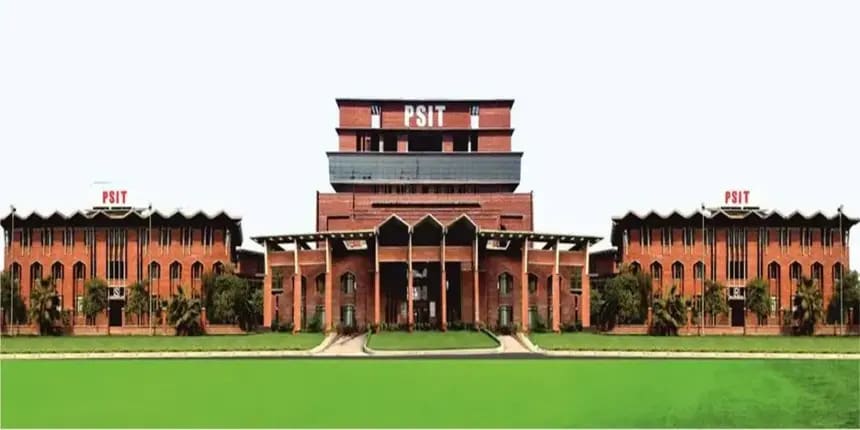Graphic Era (Deemed to be University) Admissions 2025
NAAC A+ Grade | Among top 100 universities of India (NIRF 2024) | 40 crore+ scholarships distributed
NEW DELHI: Pranveer Singh Institute of Technology (PSIT), Kanpur has started the application process for BTech programme in online mode on the official website - psit.ac.in. Candidates meeting the eligibility criteria need to visit the PSIT official website and complete the PSIT Kanpur BTech registration 2024 by submitting the required details and documents. Applicants can also apply for PSIT Kanpur BTech admissions 2024 in offline mode by visiting the college campus.

For PSIT Kanpur BTech admission 2024, students will be shortlisted on the basis of valid scores in JEE (Main)/ CUET. Before applying for PSIT Kanpur BTech admission 2024, applicants must go through the eligibility criteria and other important information to avoid any discrepancies.
Programme Name | PSIT Kanpur BTech Fee Structure (Tuition Fee) |
Rs. 1,09,296 per annum |
Mode of Application | Online/ Offline |
Note: There is no application fee for PSIT Kanpur BTech registration.
Candidates should have secured 60% or above marks in 10th, 12th (minimum 60% in PCM).
Aptitude Test (Duration: 30 minutes)/ Online Interview
Lateral Admission in BTech- II Year
Candidates must have obtained 60% or above marks in Diploma in Engineering.
Personal/ Online Interview
Candidates need to meet the eligibility criteria first as per the institution
Visit the PSIT Kanpur official website - psit.ac.in
Candidates must appear for JEE Main/ CUET and secure valid score
For PSIT Kanpur BTech admission through counselling, seats are filled through Entrance Examination conducted by NTA on the basis of rank/ score obtained in JEE (Main)/ CUET
For management seats, the institute prefers the rank/ score obtained in JEE (Main)/ CUET.
The final PSIT BTech admission will be done after verification of documents and fee payment
Pranveer Singh Institute of Technology, National Highway (NH-19), Kanpur, Bhautipratappur, Uttar Pradesh 209305
On Question asked by student community
Hello there,
Generally in PSIT entrance exams includes questions from Physics, Chemistry and Mathematics . The level of difficulty is generally considered moderate, with some questions requires higher-order thinking. For courses like BBA and BCA, the entrance exam may focus on aptitude, English comprehension and basic mathematics. Check the official PSIT website for any specific information about the entrance exam, syllabus or model question paper or you visit this link given below for more information.
https://www.careers360.com/colleges/psit-pranveer-singh-institute-of-technology-kanpur/all-questions
Hello,
Choosing between LPU (Lovely Professional University) and PSIT (Pranveer Singh Institute of Technology), Kanpur for B.Tech in Computer Science with AI/ML depends on your priorities. LPU offers a modern campus, global exposure, and an industry-aligned curriculum, along with vibrant campus life and strong placement support, though some top salary claims have faced scrutiny. PSIT, on the other hand, provides a more disciplined academic environment with a consistent placement record in companies like Infosys, TCS, and Wipro. While average packages may be lower, PSIT’s focus on job readiness is valued. If you seek global exposure and a dynamic experience, choose LPU; for structure and reliable placements, PSIT is a solid choice.
Hello Pratiksha,
PSIT (Pranveer Singh Institute of Technology), Kanpur, offers B.Tech admission through management quota with an online aptitude test.
Exam Pattern:
Mode: Online
Duration: 30 minutes
Sections: General Knowledge (10 questions), Logical Reasoning (10 questions), Quantitative Aptitude (10 questions)
Total Marks: 30
Marking: 1 mark per correct answer, no negative marking
Exam Date:
Usually held around July (exact date to be announced)
Admission Process:
Apply online on PSIT official website
Fill application form and upload required documents
Pay application fee (around Rs. 1000)
Appear for the aptitude test (if applying through management quota)
Counseling and seat allotment follow after the exam
Fee Structure (Approximate):
Total course fee: Rs. 6,00,000 for 4 years
You should check the official PSIT website or contact admissions for exact dates and details.
I hope this answer helps you. If you have more queries, feel free to share your questions with us, and we will be happy to assist you.
Thank you, and I wish you all the best in your bright future.
Hello
For admission to Pranveer Singh Institute of Technology ( PSIT ) through the management quota, candidates are required to take an aptitude test. This test is generally basic in nature , consisting of multiple-choice questions (MCQs) covering the following areas :
Basic Mathematics : Questions assess fundamental mathematical skills.
Logical Reasoning : Evaluates the ability to think logically and solve problems.
English Language Skills : Includes grammar, comprehension and vocabulary.
Additionally, aptitude tests often encompass other components such as :
Numerical Reasoning : Tests the ability to work with numbers and understand quantitative data .
Verbal Reasoning : Assesses understanding and reasoning using concepts framed in words.
Diagrammatic and Inductive Reasoning : Measures the ability to identify patterns and logical sequences.
Focusing on these areas should help in preparing effectively for the aptitude test.
Hello,
The aptitude test for admission to PSIT Kanpur includes questions from general mathematics, English comprehension and grammar, and logical reasoning.
The mathematics section typically covers basic arithmetic, algebra, geometry, mensuration, and statistics. Additionally, the test assesses numerical reasoning skills.
Hope it helps !
Ranked amongst top 3% universities globally (QS Rankings).
Among Top 30 National Universities for Engineering (NIRF 2024) | 30+ Specializations | AI Powered Learning & State-of-the-Art Facilities
Apply for Online MBA from Manipal Academy of Higher Education (MAHE)
NAAC A+ Accredited | Scholarships worth 5 CR
Apply for Online MBA from UPES
Apply for an Online MBA from Amity Online.